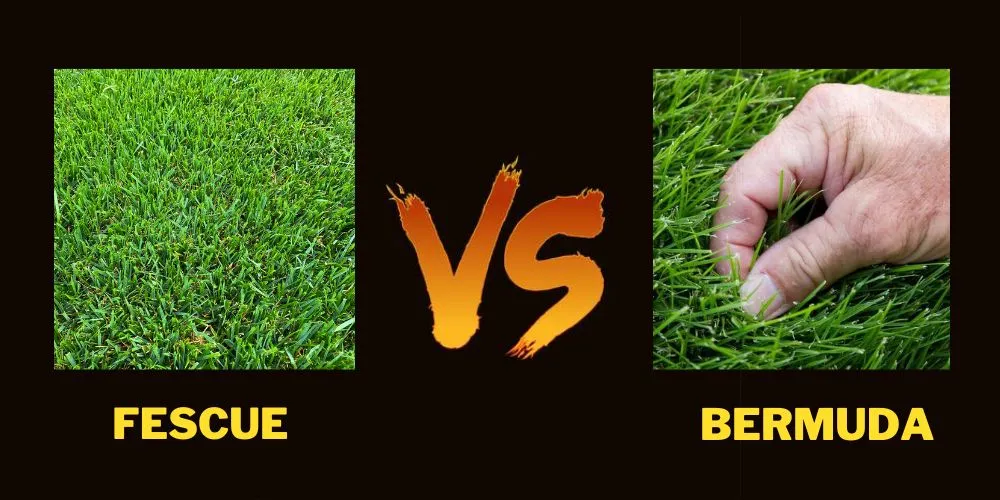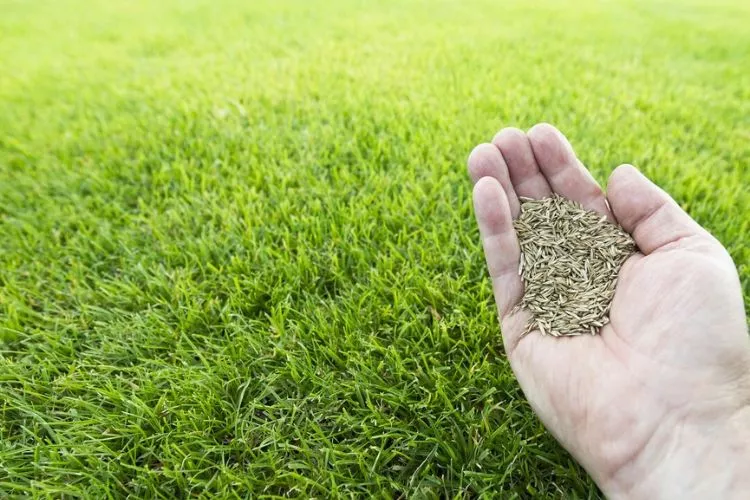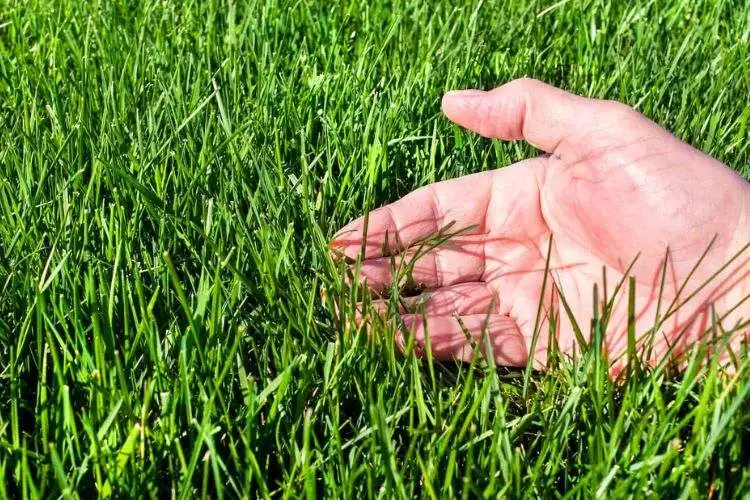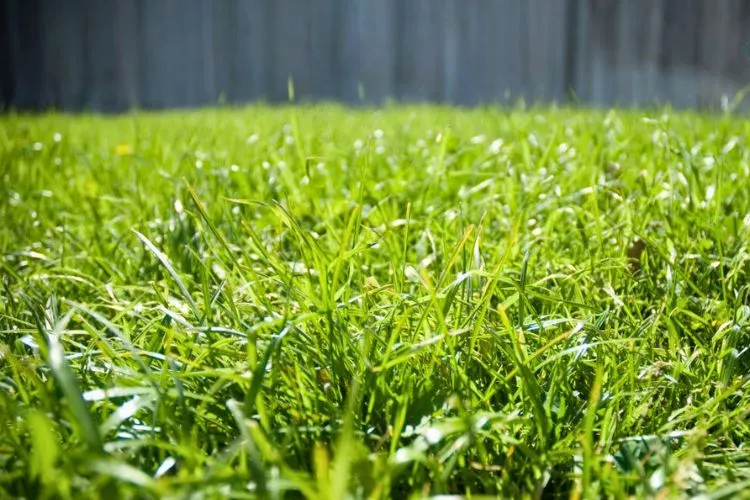Choosing the right grass for your lawn can be a daunting task. Delving into the turf war between Fescue and Bermuda, this article unpacks the strengths and weaknesses of each. Navigate your turf choices better with our comprehensive examination of these prime contenders.
Fescue Vs Bermuda: Detailed Comparison
Fescue and Bermuda grasses have long been popular for lawns and landscaping due to their distinct characteristics, resilience, and aesthetic appeal. As two of the most commonly used turfgrasses, understanding the pros and cons of each is invaluable when considering the best option for a pristine lawn.

This article will delve into the appearances, growth habits, maintenance requirements, climate suitability, and advantages and disadvantages of both Fescue and Bermuda grasses to help you make the ideal choice for your landscape needs.
1. Appearance and Characteristics
Fescue grass is characterized by its fine, narrow leaves and rich green color. As a clump-forming grass, it has a uniform appearance that thrives in sun and shade. Fescue is best adapted to cool-season climates and grows most actively in the spring and fall.
On the other hand, Bermuda grass boasts a deep-rooted system, medium-textured leaves, and a dark green color. With a higher heat tolerance, Bermuda grass thrives in warm-season climates and flourishes when exposed to full sunlight. Its aggressive growth habit allows it to establish quickly and form a dense, wear-resistant turf.
2. Maintenance and Care
Fescue requires moderate amounts of water and fertilizer to maintain its lush appearance. Proper mowing is crucial – maintaining a height of 2-3.5 inches is recommended to promote the overall health of the grass. Pest control is occasionally needed to address potential lawn issues like insects and disease.
Bermuda grass demands more intensive maintenance, requiring frequent watering, fertilization, and mowing during the growing season. Scalping Bermuda grass in the spring encourages healthier growth after dormancy, while keeping it short (1-1.5 inches) during other times promotes a tighter turf. Pest control efforts are generally comparable to Fescue’s requirements.
Regarding cost, Bermuda grass generally requires more maintenance due to its aggressive growth habits, regular cutting, and higher water consumption.
3. Climate and Environment
Fescue grass performs best in cooler climates and can be found thriving in regions where warm-season grasses struggle, such as the northern United States. Its shade tolerance also makes it a solid choice for areas with limited sun exposure.
On the contrary, Bermuda grass thrives in warm, sunny climates such as the southern United States. It can withstand extreme heat and has superior wear resistance, which makes it a popular choice for high-traffic areas such as recreational parks and athletic fields.
4. Advantages and Disadvantages
Fescue grass boasts several advantages: shade tolerance, cool-season growth, and low-maintenance requirements. It also offers resistance to common lawn diseases and pests. The main disadvantage is its limited heat tolerance and reduced growth in areas with prolonged exposure to high temperatures.
Bermuda grass is known for its strong drought tolerance, quick establishment, heat resistance, and ability to withstand heavy foot traffic.
However, the aggressive growth habits necessitate more maintenance and can lead to encroachments on surrounding plantings. Limited shade and cool tolerance may also pose a challenge in certain environments.
Fescue and Bermuda grasses have strengths and weaknesses, catering to different climate conditions and maintenance preferences. Fescue is better suited for cooler, shaded environments with less foot traffic, whereas Bermuda excels in warm, sunny climates and high-traffic situations.
Ultimately, the choice between Fescue and Bermuda grasses should be guided by regional climate, desired maintenance level, and personal aesthetic preferences.
Is Bermuda or Fescue Better?
Whether Bermuda or Fescue grass is ‘better’ depends on your specific lawn conditions and preferences.

If you’re living in a warmer climate with high sun exposure and have a lawn that gets a lot of wear and tear (from kids, pets or sports, for example), Bermuda grass might be your best bet. It’s known for its superior heat and drought tolerance and ability to withstand heavy foot traffic.
On the other hand, if you’re in a cooler climate and/or your lawn is in a shaded area, Fescue could be the superior choice. Fescue is renowned for its ability to thrive in cooler climates and tolerate shade. It also requires less maintenance than Bermuda grass.
Is It Easier to Grow Bermuda or Fescue?
The ease of growing either Bermuda or Fescue will again depend on your local environmental conditions.
Fescue is generally easier to grow in cooler climates or shaded areas, as it is tolerant of lower temperatures and less sunlight.
Bermuda can be easier to establish for warmer, sunny locations due to its aggressive growth habit, provided it gets the consistent watering it requires throughout the growth period. However, remember that Bermuda grass will require more maintenance, including frequent mowing and fertilization.
To summarise, before choosing between Bermuda or Fescue, assess the specific environmental conditions, expected foot traffic, and your maintenance preferences for your lawn.
Is Bermuda or Fescue Better in Full Sun?
Bermuda grass is generally better in full sun conditions. It thrives in warm, sunny climates and is known for its superior heat and drought tolerance. Bermuda has an aggressive growth habit and can establish quickly, forming a dense, wear-resistant turf.
On the other hand, while Fescue can tolerate some sunlight, it does not perform as well in full sun and high-heat conditions as Bermuda. For locations with high sun exposure, Bermuda would be the superior choice.

Can You Mix Bermuda and Fescue?
Yes, you can technically mix Bermuda and Fescue. Mixing the two can offer a lawn that is green throughout the year, with the Bermuda flourishing in the warm season and the Fescue remaining green during the cooler season.

However, it’s important to note that these two grasses differ considerably in appearance, growth habits, and care requirements. Bermuda’s aggressive growth may also eventually crowd out the Fescue. The uneven growth rates and maintenance needs could lead to a lawn that looks inconsistent or is difficult to manage effectively.
Instead, a more recommended approach is to use each type of grass in different areas of your landscape that suit their preferred conditions — Bermuda for sunny, high-traffic areas, and Fescue for shaded or cooler parts of the lawn. Be sure to consider the differences in appearance and the differing care requirements when making this decision.
Fescue vs Bermuda Georgia: Which Would Be Better?
Georgia’s warm climate and sunny conditions make it an ideal landscape for Bermuda grass. Bermuda’s superior heat and drought tolerance allows it to thrive during Georgia’s hot summers. This robust grass also stands up well to heavy foot traffic, making it a popular choice for recreational areas, sports fields, and home lawns in the state.
Though Fescue can grow in Georgia, the high temperatures and sun exposure during the summer months can make it challenging for Fescue to thrive without careful management.
Fescue vs Bermuda Texas: Which Would Be Better?
Similarly to Georgia, Texas’s warm to hot climate conditions – especially in its southern part – make Bermuda grass a sound choice. Bermuda’s ability to withstand heat and drought means it can withstand the hot Texas summers. Its aggressive growth habit also means it can quickly establish and recover from damage, an excellent trait for high-traffic areas.
While Fescue would be ideal for cooler, shadier areas, these conditions are not typical in most parts of Texas. Thus, unless you have a shaded lawn in one of the cooler areas of Texas (like the Panhandle), Bermuda grass would likely be the best choice for typical Texas conditions.
More on Bermuda grass if you are interested: Does Bermuda grass die in the winter? | Does Bermuda Grass Have Runners?
Conclusion:
The choice between Fescue vs Bermuda grass depends largely on location, climate, and personal lawn care preferences. Fescue excels in cooler climates and shaded areas with lower maintenance needs, offering a uniformly lush turf.
On the other hand, Bermuda grass shines in warm, sunny areas known for its heat and drought resistance, quick establishment, and robustness against heavy foot traffic. Each has its unique set of benefits and challenges.
Therefore, understanding your specific environmental conditions and maintenance preferences is key to making the best grass choice for your lawn.


